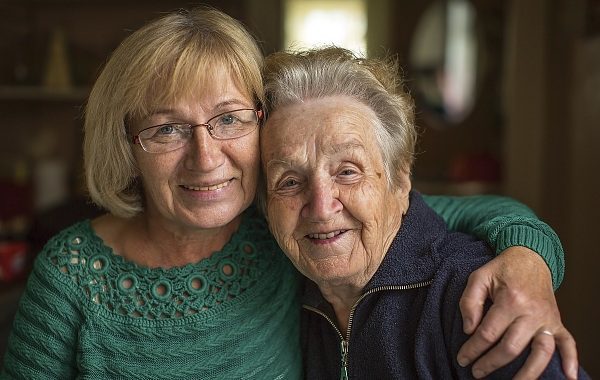It’s a familiar scenario for millions of adults: mom and dad are getting older and need help with their day-to-day activities. Or, maybe they have a chronic illness and need care they can’t provide for themselves.
The AARP estimates that roughly 40 million people provide care for ill or disabled family members, and these loving helpers often go it alone. Whether you are already helping to provide round-the-clock care for a relative or just beginning the process, save these tips from SJ professionals to help you cope.
Turn to technology
These days, there’s an app for everything – and caregiving is no exception.
Helene Weinstein of Cherry Hill Senior Living says keeping your loved one’s insurance details, contact numbers for doctors and prescription information handy is a must, but the mountains of paperwork can be overwhelming. Enter options like the AARP’s Caregiving App, which helps users communicate and delegate with family members, create medication lists, store contact info, keep easily accessible notes of health changes and create task lists.
Other apps, such as Balance: For Alzheimer’s Caregivers and Elder 411, provide helpful tips and resources on everything from safety and mobility to elder research and news.
There are also a number of high-tech gadgets that can make life easier for you and your loved one. Products like Invisible GPS and home motion sensors are especially helpful for caregivers of people with Alzheimer’s or dementia who might wander away from home. Others, like medical alert devices and automatic pillboxes, are tried-and-true tech aids that can reduce stress and streamline the day-to-day routine for caregivers.
Have the conversation – now
A caregiving conversation can be a difficult one to start, but it’s something that must be done, says Eva Russell, director of clinical support at Samaritan Healthcare and Hospice.
“Over the years, even before you or a family member needs care, have ongoing conversations to determine what is important to your loved one, how he or she defines a good quality of life, and what type of care and medical treatments he or she would want or not want,” says Russell, a registered nurse and certified wound specialist. “What’s going to initiate the conversation is a change in health status. Obviously it’s optimal to have the conversation before you have to make those decisions about health.”
Ask direct questions to start the conversation. “What’s important to them?” Russell asks. “Do they want to go to the hospital if there’s an issue, or do they want to stay at home? If they receive a terminal diagnosis, do they want to allow natural death to occur?”
It’s especially hard to talk about these life-altering decisions if mom or dad is still healthy, adds Weinstein, but encourage them to make their wishes clear.
“It’s best to have a written understanding of what they want,” Weinstein says. “In the event that they can no longer communicate, know their wishes ahead of time. Do they want you to bring someone in to take care of them? Do they want assisted living? How much do they want physicians to do to keep them alive? They should state clearly if they want to be marked what we call DNR – do not resuscitate.”
Arm yourself with info
There are numerous resources available to caregivers, but you have to seek them out.
“The first thing to do is to find out if your loved one is eligible for services, whether they are home health or hospice services,” says Russell. “If they are not, are they eligible for medical equipment, like a hospital bed? Sometimes that makes a huge difference.”
Talk to the physicians caring for your loved ones – they can write prescriptions for everything from home care to physical, speech or occupational therapies, says Russell. Other professionals, such as lawyers and accountants, can also answer financial and legal questions you may encounter as a caregiver.
And while professionals can offer a wealth of information, it can be especially helpful to connect with and learn from other people who are dealing with the same caregiver issues.
Russell recommends joining online support forums and local groups that meet regularly. “You’ll learn that there are many services and organizations that stand ready to help you,” she says. Russell will host a group session called “Tips for Caring for Your Loved One” in January, and Samaritan also offers workshops about coping with loss and the stress of the holidays.
Build your team
A caregiver is only as good as the team around them. It’s vital to assess what you can do on your own and then fill the gaps with family members, friends and services whenever you can.
Family is often the easiest place to start, and working together will allow you to plan around everyone’s schedules and abilities, says Russell. “Have the family meeting, and get all of the issues out on the table. Go around the room, and ask, ‘What are you able to do? And what are you able to do? What’s your schedule look like?’”
Be open and honest about what you are comfortable doing, adds Russell. If your family members aren’t comfortable or able to help with the hands-on tasks like personal care, consider requesting their hands-off assistance for things like grocery shopping or making phone calls. Sometimes the best way to get help is to match people with a task they’re most willing or able to do.
“Maybe in the case of a son taking care of his mother, he’s uncomfortable taking care of her and her needs,” Russell says. “The issue of incontinence is a big piece – sometimes people don’t want to do that, and they’ll wait for the home healthcare providers to do it. But that might mean the patient is waiting all night to be changed – it’s a skin care nightmare.”
Make sure this is discussed, Russell says, and if it can’t be reconciled, consider hiring additional help. A number of organizations, such as the Family Caregiver Alliance and Eldercare Locator, can connect you to local services and assistance.
You can also investigate adult day care or respite care at an assisted-living facility, suggests Weinstein. Cherry Hill Senior Living offers both options – whether for a week or a few months – so your loved one is provided with exceptional care while you enjoy peace of mind.
Don’t forget about yourself
A recent AARP study found that on average, caregivers spend more than 20 hours a week providing care. That amount of time can lead to changes in your free time and work life – 70 percent of working caregivers say they made some job change to accommodate the time they spent providing care to a loved one.
“You need to stay healthy and well, because if you break down, then what?” says Russell. She stresses that it’s important to eat healthy, exercise and find ways to get enough sleep, whether that’s by splitting the work with a family member or hiring help.
When a cup of coffee or a phone chat with a friend isn’t enough to boost your mood, Weinstein says you have to speak up. “Don’t be afraid to say you need a break. No one can do it all, all of the time.”
She recommends using a journal to keep track of your feelings and setting goals for yourself. “Tell yourself when you are going to take a break. Go for a massage or a girls’ night out – something to take care of you,” says Weinstein. “Develop a support system – if you’re feeling overwhelmed or angry, you have that support system to rely on and ask for help. The caregivers who get help are able to provide care for a longer period of time.”









